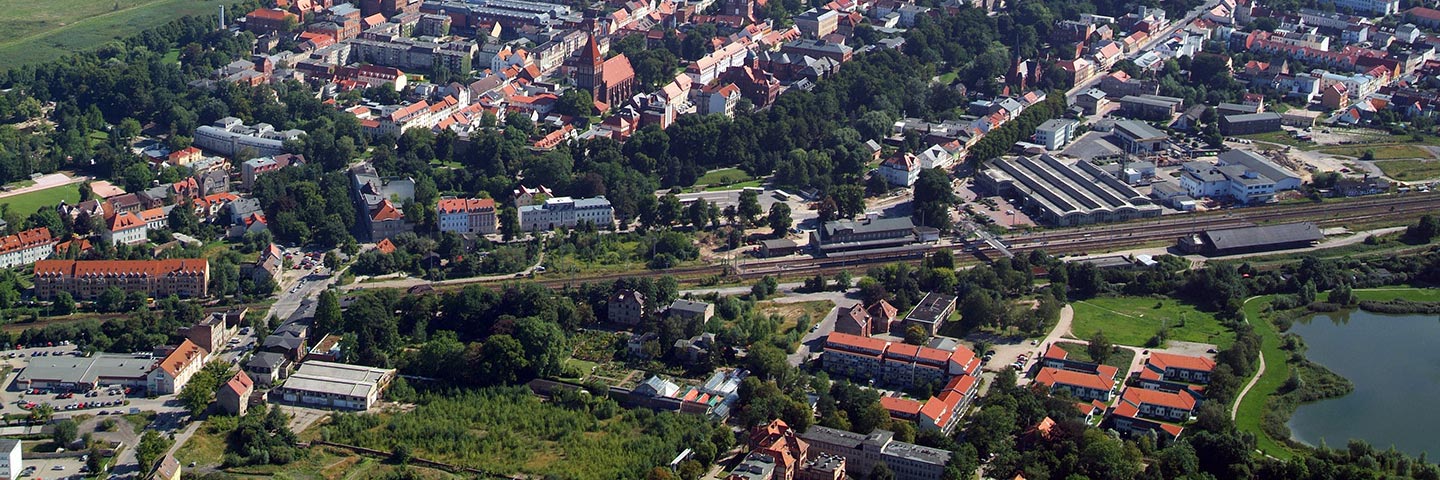News/All pieces
Save the Date (for wetter faster)
Conference: Accelerating peatland climate protection
28/02/2023 The German Federal Foundation for the Environment and the Greifswald Mire Centre jointly invite you to the conference Accelerating peatland climate protection - How to bring peatland rewetting to grande scale on 1st June 2023. In order to achieve the German climate protection goals by 2045, peatland protection must take up speed. But hurdles are still high. The Action Programme for Natural Climate Protection and the National Peatland Protection Strategy now offer the opportunity to remove obstacles to peatland protection projects and to accelerate planning and approval at both federal and state level. How this could look like in concrete terms will be demonstrated and discussed during the conference at the DBU Centre for Environmental Communication in Osnabrück, including research results from the Greifswald Mire Centre and experiences from various peatland and climate protection projects in the peatland-rich federal states.
Small peat moss saves CO2 big style
85 percent less carbon dioxide emissions
27/03/2023 Growing peat mosses on rewetted raised bog areas instead of draining them and using them as grassland can save up to 85 percent of greenhouse gas emissions. This was the finding of a research team from the Universities of Rostock and Greifswald, which for the first time has drawn up a greenhouse gas balance for the entire cultivation cycle of peat mosses. The scientists now present the results in the article Full-cycle greenhouse gas balance of a Sphagnum paludiculture site on former bog grassland in Germany in the international journal Science of the Total Environment. They thus provide further arguments for the MOOSstart project that has just begun. In the three-year joint project of the University of Greifswald together with partners, the cultivation of peat mosses in paludiculture is to be promoted. In the process, the production of seeds for the small plant is to be advanced on a large scale in a bioreactor.
The project with the detailed title "Yield increase and upscaling of seed production and application as an initial for the cultivation of renewable peat moss biomass in paludiculture" is carried out by the universities of Greifswald and Freiburg, as well as the Hochschule Anhalt and the practical partner Niedersächsische Rasenkulturen (NIRA). MOOSstart is further developing a process in which vegetative plant material is sterilely propagated in a photobioreactor, constructing a low-cost bioreactor for this purpose and testing it. It is also working on suitable technology for sowing the seeds produced and is developing methods to increase crop yields. The scientists would like to make a contribution to climate-neutral peatland use and substrate management.
Mean Methane and what to do with it
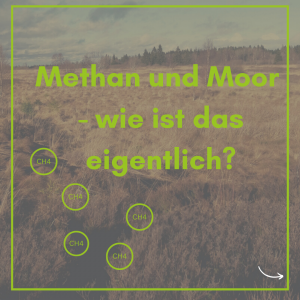
New Factsheet available
20/12/2022 In a nutshell, our new factsheet explains The role of methane in peatland rewetting. Wet peatlands release methane (CH4), and the climate-damaging greenhouse gas is also produced when rewetting formerly drained areas. It has a much stronger effect on the climate than carbon dioxide (CO2), but remains in the atmosphere for comparably short time. By 2030, methane emissions are to be reduced by 30% worldwide compared to 2020. Does this now argue against restoring peatlands? It doesn't, as the new factsheet explains: Addressing the climate crisis requires reducing atmospheric concentrations of all three greenhouse gases relevant to peatlands (CH4, CO2, nitrous oxide (N2O)). Rewetting effectively reduces long-lived CO2 emissions from peatlands to zero effectively and quickly and is therefore always the right choice for climate protection.
More wet peatlands than expected
New study in Nature
8/02/2023 The global loss of wetlands is smaller than previously assumed, according to the recent study Extensive global wetland loss over the last three centuries in the internationally renowned scientific journal Nature. Peatland scientists from the University of Greifswald, partner in the Greifswald Mire Centre, have contributed data from their Global Peatland Database and from the historical holdings of the local peatland library. The results now help to better assess the climate impact of peatlands, e.g. to quantify the change in carbon storage and in methane emissions. It also allows conclusions to be drawn about the impact of wetland loss and how wetland restoration can be better planned .
The study by an authors' collective led by Standford University shows that only 21-35% of the world's wetlands have been lost since 1700, instead of 50-87% as previously thought. In a historically first reconstruction, the scientists combed through thousands of records of drainage and land-use change in 154 countries for the study to compare them with the current distribution of drained and altered wetlands to get a picture of the state since 1700.
"In terms of area, the loss is not as great as is often claimed. What seems to be good news at first glance, however, should not deceive us. Worldwide, about four million km² of wetlands have disappeared, of which about 0.5 million km² are wet peatlands. However, drained peatlands are responsible for 4-5% of global greenhouse gas emissions: they are relatively small areas but with huge consequences!" says Prof. Dr. Dr. Hans Joosten, emeritus professor and co-author of the study.
On World Wetlands Day
Peatlands in audio
2/02/2023 On the occasion of the World Wetlands Day on 2nd February, Greifswald has "Peatland on your ears". On this day, for the first time an audio walk will be published via the local Greifswald App and will take you to the peatlands around Greifswald. So - download the app onto your smartphone or tablet - and off you go.
The walk across the "meadows near Greifswald", which Caspar David Friedrich captured in his painting of the same name, is a bit like "I spy with my little eye". There is much to discover that is not visible at first glance. For instead of meadows, the painter's painting actually shows peatlands outside the city gates.
All those interested are cordially invited to try out the peatland walk on the World Wetlands Day on Thursday 2nd February. Together with Lord Mayor Dr. Stefan Fassbinder, the new professor for "Peatland Research / Peatland Science" at the University of Greifswald, Gerald Jurasinski, the SPD Member of Parliament Anna Kassautzki and the organic farmer Dörte Wolfgramm-Stühmeyer, they will walk across the Steinbecker Suburban polder. They will be accompanied by Christina Lechtape from the Succow Foundation, partner in the Greifswald Mire Centre, which was in charge of developing the walk in the MoKKa project, Thomas Beil, managing director of the Greifswald Agricultural Initiative, and moor manager Annie Wojatschke, who contributed to the audio walk. The meeting point is at 2 pm at the Steinbecker Vorstadt pumping station - with smartphone in hand and downloaded app, of course.
The audio walk is based on the brochure Moore bei Greifswald, published by the Succow Foundation.
Totally new: peatland professor and professorship
Welcome to Dr Gerald Jurasinski
16/01/2023 With Dr. rer. nat. Gerald Jurasinski, the new W3 professorship for Peatland Science at the University of Greifswald has been filled since the beginning of 2023. This makes the University of Greifswald the only university with a peatland science professorship in Germany. The creation of the professorship, agreed in 2018 by the University of Greifswald and the state government of Mecklenburg-Vorpommern (M-V), takes the tradition and excellence of Greifswald's peatland research, as well as the high proportion of peatland in the state's land area into account.
The Greifswald Mire Centre, in which the University of Greifswald is a partner, is extremely pleased about the strengthening of research and teaching: "We have been engaging to establish this position with many allies since 2015 and are very grateful to all supporters that the professorship could finally be filled with Gerald Jurasinski," Dr. Greta Gaudig and Dr. Franziska Tanneberger from the Greifswald Mire Centre say. Dr. Gerald Jurasinski has ambitious plans for the professorship: "We need to make much faster progress in peatland rewetting. Our research will show how we can do better. In doing so, we not only want to generate knowledge, but also disseminate it and further develop Greifswald as a central hub of peatland expertise. Among other things, we want to continue building a network with many national and international partners that measures greenhouse gas emissions and other ecosystem services of peatlands in M-V and beyond. Our results will help us to act in the right way, especially with regard to climate protection."
Those interested can meet Dr Jurasinski at the public lecture “A brief history of research on greenhouse gas emissions from peatlands in northern Germany” on 17th January at 6 pm at the Alfried Krupp Wissenschaftskolleg or during a short walk across Greifswald's peatlands on the occasion of World Wetlands Day on 2 February. The walk starts at 2 p.m. at the Stralsunder Straße bridge at the harbour.
For more information, see the GMC press release on the peatland professorship.
Out now: Peatland Atlas
The first ever - hot off the press and online
10/01/2023 Peatlands are not scary, they are incredibly important - the fight against the climate crisis, biodiversity conservation and simply for all of us. This is still known far too little. With the Peatland Atlas - Facts and Figures on Wet Climate Protectors, the publishers Heinrich Böll Foundation, Friends of the Earth Germany (BUND) and the Michael Succow Foundation, partners in the Greifswald Mire Centre, are working to change that. On Tuesday 10th January, they will present the Peatland Atlas in a press conference in Berlin and online.
On 50 pages and with 52 illustrations, the Peatland Atlas 2023 not only highlights the history of peatlands, their importance as unique habitats for the global climate and biodiversity, and their destruction with local and global consequences. It also explains how we can protect peatlands and restore their functionality. It shows the potentials of wet peatlands for climate protection and opportunities for their wet use, paludiculture, and at the same time how politics and society can act now.
Paludiculture: How to and with what plants?
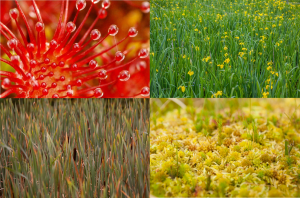
Two new GMC publications show it
20/12/2022 You happen to have a peatland where you want to implement paludiculture, but don't know how? Convert an entire farm to "wet" agriculture - how can that be done? Or - you might be looking for the biomass from wet land for new products? For questions like these, the new Guide to Implementing Paludiculture (German only) within the GMC proceedings offers information. It aims at land managers, landowners, project sponsors, water and soil associations, government agencies, agricultural advisors, research institutions, and potential utilization companies. The guide covers five areas: Site suitability, planning and permitting for conversting sites to paludiculture, practical tips for establishment and management of sites, as well as utilisation of the biomass produced and support - including examples of implementation.
The publication Potential Paludiculture Plants of the Holarctic (English only) presents which plants are suitable for paludiculture in the Holarctic. In 440 pages, There are profiles of 95 plant species from the Database of Potential Paludiculture Plants (DPPP). Most are promising for sustainable wet land use on peatlands. Some might be considered critically since the paludiculture potential finds its limits, for example, in terms of new peat formation. In the plant portraits, comprehensive information has been compiled on the characterisation of the species, site requirements, cultivation as well as possible uses of the plant.
Why peatlands matter in 74 min and 4 chapters
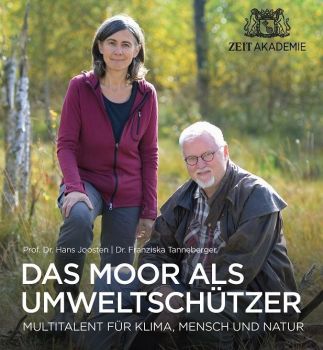
New: Online course by ZEITAkademie and GMC
8/12/2022 Peatlands as a multi-talent for climate, humans and nature – that seemed a sufficiently “burning” topic to ZEIT Akademie. In cooperation with the Greifswald Mire Centre th education provider produced an online course Peatlands as environmental protectors. It has four chapters and 74 minutes. Starring: Prof. Hans Joosten, scientist and one of the GMC’s founders, who has been awarded the German Environmental Prize in 2021 and the Federal Cross of Merit in 2022. He explains the basics on peatlands. Dr. Franziska Tanneberger describes why drained peatlands harm the climate and why we need peatland protection. The studied landscape ecologist and one of the two directors of the GMC is always in action for peatlands -from field work to world climate summits. Henning Voigt, an agricultural pioneer on peatland, takes the participants with him on his rewetted areas and tinkerer Torsten Galke invites to visit in the Paludiculture Tiny House. Dr. Johannes Merck of Michael Otto Environmental Foundation reports that even large companies do trecognise the economic potential in peatlands today. To develop a climate-friendly use of wet and rewetted areasareas is part of the toMOORow initiative, which promotes peatland rewetting as a nature-based solution to the climate crisis and species extinction, as well as an example of sustainable regional creation of added value through paludiculture.
According to its own information, ZEIT Akademie works with the best experts in their respective fields, such as the climate scientist Prof. Stefan Rahmstorf. An important argument for the two GMC scientists. "For today's challenges, science must not remain in the ivory tower. We want to teach peatlands in a non-university context as well." says Franziska Tanneberger "Of course, the quality must not be lost in and the subject must not suffer due to severe briefness. In this course, that can be combined." Another consideration: The ZEITAkademie's offerings are aimed at private individuals, but primarily at companies for in-house training. A good opportunity to foster a change in a wider public perception of peatlands - because peatlands are not scary, but incredibly important - for all of us.
Global Peatland Assessment
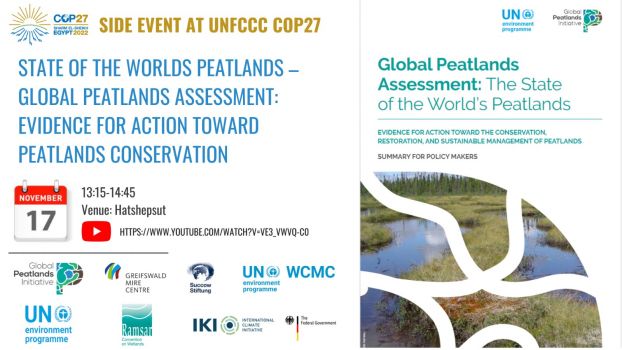
Thur 17th Nov at COP27/Sharm el-Sheikh
16/11/2022 A first comprehensive assessment of global peatlands will be presented in an official side event State of the Worlds Peatlands – Global Peatlands Assessment: Evidence for action toward peatlands conservation at the World Climate Summit COP27 at 17th November 2022 from 13:15-14:45 (GMT+2). The assessment includes an updated version of the Global Peatland Map compiled by the Greifswald Mire Centre (GMC) and provides latest science on peatland distribution, trends, and pressures. Most importantly, it recommends actions for the conservation, restoration, and sustainable management of peatlands, in particular for climate protection and adaptation to climate change.
At the side event, the GPA’s input information, spatial data generation, collation approaches, and the current gaps in coverage and resolution are presented in detail.
In a global context of the UNEA-4 Resolution on the “Conservation and Sustainable Management of Peatlands” the assessment might be a step towards a future Global Peatlands Inventory.
The side event is organised by Succow Foundation (MSF)/Greifswald Mire Centre (GMC) in cooperation with the United Nations Environmental Programme (UNEP), Global Peatlands Initiative (GPI) and UNEP-WCMC together with the Convention on Wetlands.
